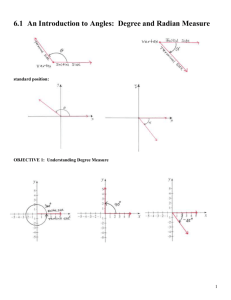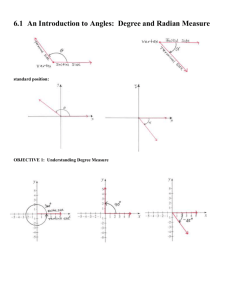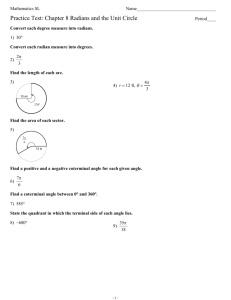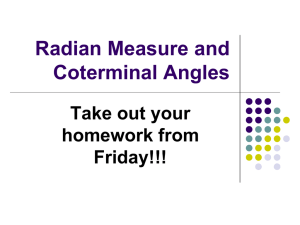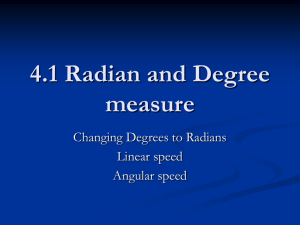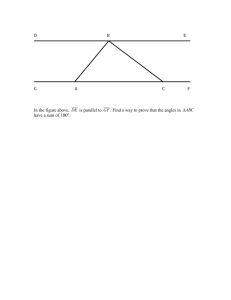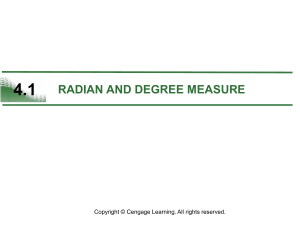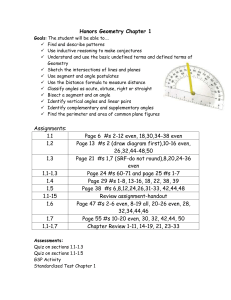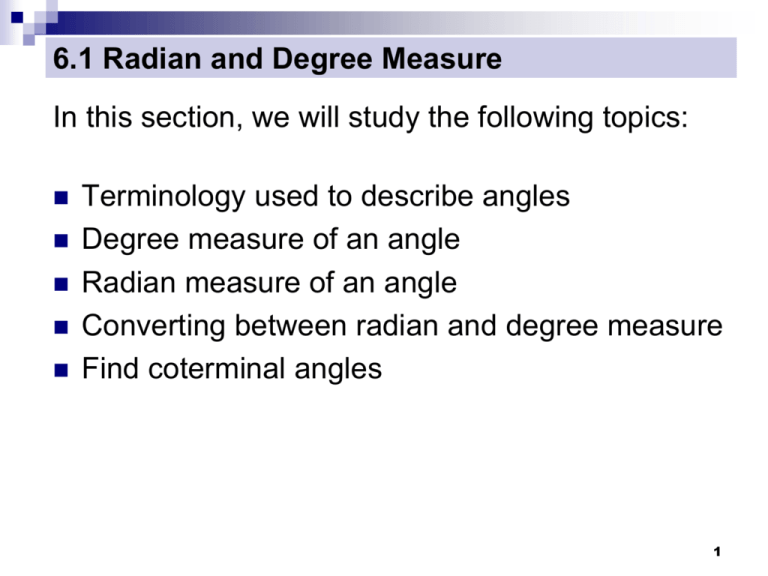
6.1 Radian and Degree Measure
In this section, we will study the following topics:
Terminology used to describe angles
Degree measure of an angle
Radian measure of an angle
Converting between radian and degree measure
Find coterminal angles
1
6.1 Radian and Degree Measure
Angles
Trigonometry: measurement of triangles
Section 4.1, Figure 4.1, Terminal and
Angle Measure
Initial Side of an Angle , pg. 248
Copyright © Houghton Mifflin Company. All rights reserved.
Digital Figures, 4–2
2
6.1 Radian and Degree Measure
Standard Position
Section 4.1, Figure 4.2, Standard
Position of an Angle, pg. 248
Vertex at origin
Copyright © Houghton Mifflin Company. All rights reserved.
The initial side of an angle
in standard position is always located
on the positive x-axis.
Digital Figures, 4–3
3
6.1 Radian and Degree Measure
Positive and Section
negative4.1,
angles
Figure 4.3, Positive and
Negative Angles, pg. 248
When sketching angles,
always use an arrow to
show direction.
Copyright © Houghton Mifflin Company. All rights reserved.
Digital Figures, 4–4
4
6.1 Radian and Degree Measure
Measuring Angles
The measure of an angle is determined by the amount of
rotation from the initial side to the terminal side.
There are two common ways to measure angles, in degrees
and in radians.
We’ll start with degrees, denoted by the symbol º.
1
One degree (1º) is equivalent to a rotation of
360
revolution.
of one
5
6.1 Radian and Degree Measure
Section 4.1, Figure 4.13, Common Degree
Measures on the Unit Circle, pg. 251
Measuring Angles
1
360
Copyright © Houghton Mifflin Company. All rights reserved.
Digital Figures, 4–9
6
6.1 Radian and Degree Measure
Classifying Angles
Angles are often classified according to the quadrant
in which their terminal sides lie.
Ex1: Name the quadrant in which each angle lies.
50º
Quadrant 1
208º
Quadrant 3
II
I
-75º
Quadrant 4
III
IV
7
6.1 Radian and Degree Measure
Classifying Angles
Standard position angles that have their terminal side
on one of the axes are called quadrantal angles.
For example, 0º, 90º, 180º, 270º, 360º, … are
quadrantal angles.
8
6.1 Radian and Degree Measure
Coterminal Angles
4.1, Figure
4.4,
Coterminal
Angles thatSection
have the same
initial and
terminal
sides are
coterminal.
Angles, pg. 248
Angles and are coterminal.
Copyright © Houghton Mifflin Company. All rights reserved.
Digital Figures, 4–5
9
6.1 Radian and Degree Measure
Example of Finding Coterminal Angles
You can find an angle that is coterminal to a given angle by
adding or subtracting multiples of 360º.
Ex 2:
Find one positive and one negative angle that are
coterminal to 112º.
For a positive coterminal angle, add 360º : 112º + 360º = 472º
For a negative coterminal angle, subtract 360º: 112º - 360º = -248º
10
Ex 3. Find one positive and one negative angle that is
coterminal with the angle = 30° in standard position.
Ex 4. Find one positive and one negative angle that is
coterminal with the angle = 272 in standard position.
6.1 Radian and Degree Measure
Radian Measure
A second way to measure angles is in radians.
Definition of Radian:
4.1, Figure
Illustration
One radian isSection
the measure
of a 4.5,
central
angle ofthat intercepts
pg. r249
arc s equal in lengthArc
to Length,
the radius
of the circle.
In general,
s
r
Copyright © Houghton Mifflin Company. All rights reserved.
Digital Figures, 4–6
12
6.1 Radian and Degree Measure
Radian Measure
2 6.28
3.14
2 radians corresponds to 360
radians corresponds to 180
2
radians corresponds
904.6, Illustration of
Section 4.1,to
Figure
Six Radian Lengths, pg. 249
Copyright © Houghton Mifflin Company. All rights reserved.
2
1.57
Digital Figures, 4–7
13
6.1 Radian and Degree Measure
Common
Section 4.1, Figure 4.7,
Radian Measure
Radian Angles, pg. 249
14
6.1 Radian and Degree Measure
Conversions Between Degrees and Radians
1.
2.
To convert degrees to radians, multiply degrees by
To convert radians to degrees, multiply radians by
180
180
15
Ex 5. Convert the degrees to radian measure.
a)
60
b)
30
c)
-54
d)
-118
e)
45
Ex 6. Convert the radians to degrees.
a)
6
b)
2
c)
11
18
d)
9
Ex 7. Find one positive and one negative angle that is
coterminal with the angle =
in standard position.
3
Ex 8. Find one positive and one negative angle that is
7
coterminal with the angle =
in standard position.
5
Degree and Radian Form of “Special” Angles
90 °
120 °
60 °
135 °
45 °
150 °
30 °
0°
180 °
360 °
210 °
330 °
225 °
315 °
240 °
300 °
270 °
19
Class Work
Convert from degrees to radians.
1. 54
2. -300
Convert from radians to degrees.
3. 11
3
4. 13
12
Find one postive angle and one negative
angle in standard position that are
coterminal with the given angle.
5. 135
11
6.
6
HW p474
1-29 odd, 37-41odd,
43-47odd
22

